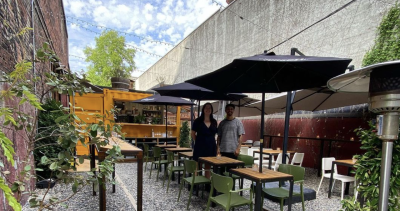Vancouver mayor Gregor Robertson repeats call for Canada to drop criminal penalties for drug possession
The mayor of Vancouver has issued another call for the Canadian government to eliminate criminal penalties for the personal possession of illegal narcotics.
“We are losing our friends and family to a poisoned drug supply and a legal framework that treats addiction as a criminal issue, not a life-threatening health condition,” Gregor Robertson said today (April 6) in a media release. “People are dying from poisoned drugs every day in Vancouver and we cannot accept this preventable catastrophe—we need to ensure people with addictions can access safe drugs and effective treatment options.
“Decriminalizing possession, combined with health care supports including prevention, harm reduction, and treatment, will save many lives,” he added.
The mayor’s statement supports a policy position that was established in a March 9 city media release. There, Vancouver officially “recommended” that the Government of Canada “immediately” decriminalize the personal possession of all drugs, including hard drugs like cocaine and heroin.
Today’s statement from the mayor follows the April 5 publication of a B.C. Coroners Service report that states there were 102 fatal overdoses across B.C. in February 2018.
That number continues what’s come to be referred to as the “new normal”. Since November 2016, more than 100 people have died of a drug overdose each month in B.C. (save for two months when there were 92 and 98 deaths). For comparison, during 2015, the average number of fatal overdoses each month was 41, and during 2014, the average was 31.
The coroners service has reported that the dangerous synthetic opioid fentanyl was associated with 83 percent of deaths in 2017. That’s up from 67 percent the year before and from 29 percent in 2015.
Robertson’s call for Canada to decriminalize the personal possession of drugs is rooted in an understanding that it would minimize stigma, remove fear of prosecution, and therefore encourage people using drugs to seek treatment and to use in more public circumstances in ways that are safer than using alone.
Prime Minister Justin Trudeau has, however repeatedly dismissed calls for decriminalization (usually in response to questions from Vancouver residents).
“We’re not looking at decriminalization or legalization of any other drugs other than what we’re doing with marijuana,” the Liberal party leader told Global News while in B.C. last August.
In Canada, drugs like cocaine, heroin, and illicit fentanyl are illegal at the federal level. They’re listed in Canada’s Controlled Drugs and Substances Act, which describes their possession as a criminal offence. That means you can go to jail simply for having these substances in your pocket, which leads people to hide their drug use.
Vancouver’s call for the government to decriminalize drugs would involve removing sections of the Controlled Drugs and Substances Act that apply to the personal possession of the drugs in question.
It would require changes to federal legislation but relatively simple changes.
In response to the City of Vancouver’s recommendation for Canada to decriminalize drugs, Health Canada issued a statement that reiterated the prime minister’s refusal to discuss the issue.
“We are not looking to decriminalize or legalize all illegal drugs; but there are important steps we can take to treat problematic substance use as a public health issue—not as a criminal issue,” it reads in part.















Comments